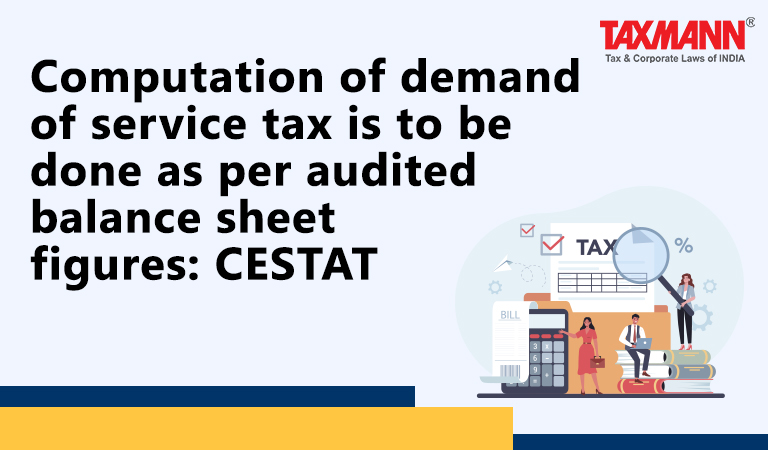Computation of demand of service tax is to be done as per audited balance sheet figures: CESTAT
- Blog|News|GST & Customs|
- 2 Min Read
- By Taxmann
- |
- Last Updated on 21 April, 2022

Case Details: R D Contractors And Consultants v. CCE & Service Tax, Panchkula, - [2022] 137 taxmann.com 288 (Chandigarh - CESTAT)
Judiciary and Counsel Details
-
- Ashok Jindal, Judicial Member
- Vikrant Kackria, Adv. for the Appellant.
- Amandeep Kumar, AR for the Respondent.
Facts of the Case
The appellant is the provider of works contract service and was paying 50% service tax thereon and remaining 50% of service tax payable by the service recipients under reverse charge mechanism. An investigation was conducted against the appellant and it was found that in certain cases, it has collected the full tax instead of 50%. The Adjudicating authority had issued a Show Cause Notice under Section 73 of the Finance Act, 1994 (‘the Act’) for recovery of the excess service tax collected and has calculated the same taking higher of Form 26-AS or Balance Sheets.
The assessee argued that if any amount is collected more than the actuals, the said amount is recoverable from the assessee under Section 73-A of the Act and cannot be demanded under Section 73 of the Act. Section 73 of the Act deals with adjudication of cases where service tax not levied or paid or short-levied or short-paid or erroneously refunded and Section 73A deals with payment of service tax excess collected from any person.
CESTAT Held
The Tribunal confirmed the above argument of the assessee and held that excess amount recovered by the appellant cannot be demanded under Section 73 of the Act.
It was further held that figures of the balance sheets are more authenticate for computation, therefore, their computation of demand of service tax is to be done as per balance sheets figures. The approach taken by adjudicating authority is not correct.
Disclaimer: The content/information published on the website is only for general information of the user and shall not be construed as legal advice. While the Taxmann has exercised reasonable efforts to ensure the veracity of information/content published, Taxmann shall be under no liability in any manner whatsoever for incorrect information, if any.

Taxmann Publications has a dedicated in-house Research & Editorial Team. This team consists of a team of Chartered Accountants, Company Secretaries, and Lawyers. This team works under the guidance and supervision of editor-in-chief Mr Rakesh Bhargava.
The Research and Editorial Team is responsible for developing reliable and accurate content for the readers. The team follows the six-sigma approach to achieve the benchmark of zero error in its publications and research platforms. The team ensures that the following publication guidelines are thoroughly followed while developing the content:
- The statutory material is obtained only from the authorized and reliable sources
- All the latest developments in the judicial and legislative fields are covered
- Prepare the analytical write-ups on current, controversial, and important issues to help the readers to understand the concept and its implications
- Every content published by Taxmann is complete, accurate and lucid
- All evidence-based statements are supported with proper reference to Section, Circular No., Notification No. or citations
- The golden rules of grammar, style and consistency are thoroughly followed
- Font and size that’s easy to read and remain consistent across all imprint and digital publications are applied



 CA | CS | CMA
CA | CS | CMA
